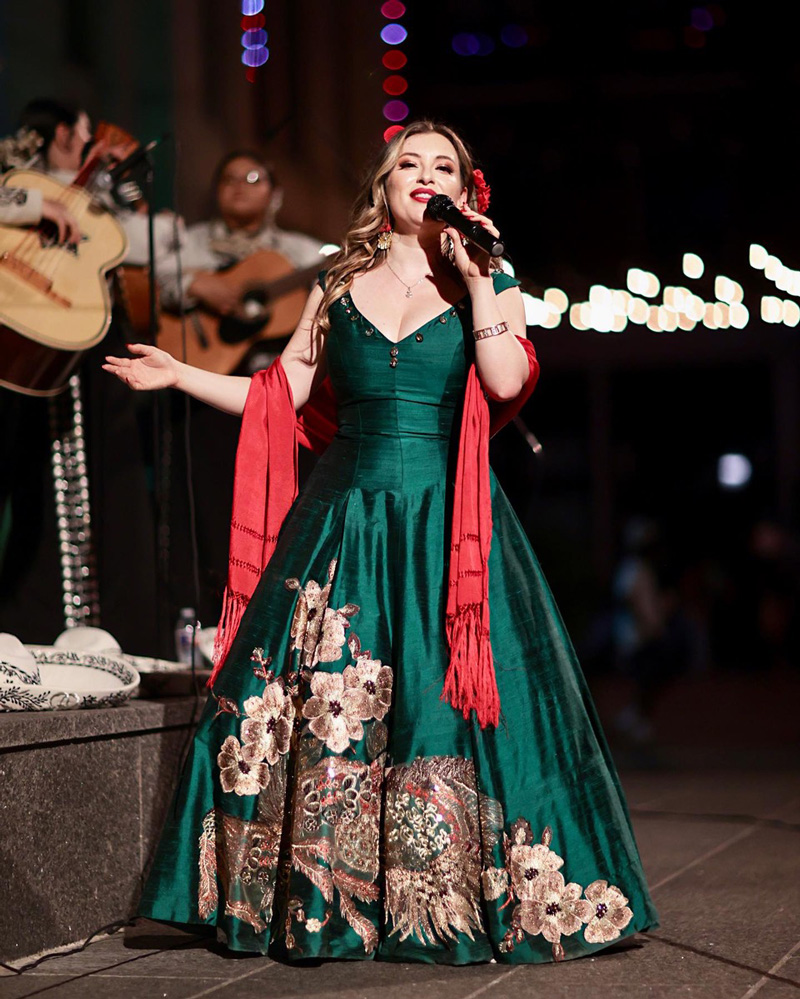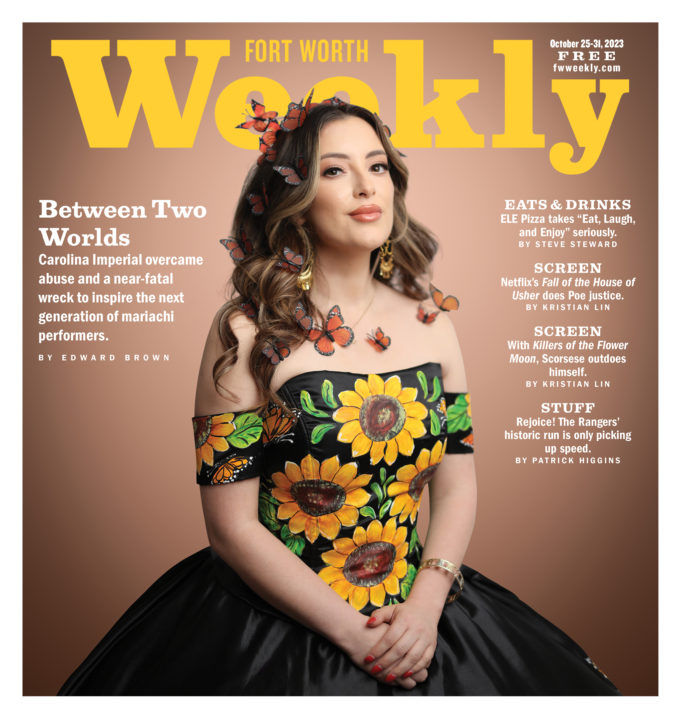Growing up in North Crowley, Carolina Imperial found an early passion for singing mariachi but no outlets at North Crowley High School for performing the traditional folk music of Mexico. UIL music competitions didn’t formally add mariachi until 2019, meaning Imperial was relegated to singing European classical pieces in school.
“My classmates called me ‘mariachi girl’ because I was already performing on the side,” she said with a laugh.
Now 33, Imperial is an in-demand mariachi performer who regularly sings at quinceañeras and weddings in addition to large venues like Sundance Square Plaza, where she performs Wednesday, Nov. 1, at 8 p.m. in celebration of Día de los Muertos. As an artform reflecting Texan and Mexican culture and history, mariachi is finally receiving the attention and respect it deserves, she said. She points to recent performances by Los Lobos’ David Hidalgo on Jimmy Kimmel Live and the rise of a new generation of popular young mariachi artists like Ángela Aguilar and Christian Nodal whose songs reach millions of young listeners north and south of the border.
“The younger generation is listening to these new mariachi singers, and they are falling in love with the music that their mom, dad, and grandparents listened to,” she said. “These musicians have a younger look, but they are sticking to the original style.”
The genre that dates back to the 19th century has always been about storytelling, she said. Imperial began writing her own songs just last year, following a near-fatal car accident involving a drunk driver. It made the artist wonder what her legacy would be if she weren’t writing songs.
“I never thought I had it in me to compose,” she said. “If my life had been taken that moment, there wouldn’t have been anything left to tell my story.”
Sonically, Imperial’s songs stay true to the rich guitar- and string-based sounds that define mariachi. Like other vocalists in the genre, she imbues her pitch-perfect mezzo-soprano with passionate, yearning inflections, but her lyrics are contemporary and speak to the tribulations of today’s young Hispanic women. While mariachi traditionally leans on stories of broken hearts, Imperial delves into contemporary topics like financial abuse. She speaks from personal experience. In mid-2020, she filed for divorce around the time she fled her allegedly abusive husband. Imperial feels the local nonprofit SafeHaven saved her life. Last year, the Catholic Church annulled the marriage, giving the young singer-songwriter another chance to find love and, perhaps one day, start a family.
Social media offers the opportunity for her to encourage other women to seek help, she said, adding that it’s important not to dwell on her trauma or that of listeners.
“I share a lot of information about SaveHaven,” she continued. “Focusing on the abuse can be triggering for survivors. They know what hell they are living in.”
One piece of advice Imperial learned was to keep an emergency bag in your car and to stock it slowly with critical supplies in case there is an opportunity to flee.
The native of Monte Rey, Mexico, openly talks about her status as a DACA recipient, which effectively protects her residency in the United States. She is currently applying for special status as a survivor of domestic violence, something that she hopes will further guarantee her protected work status and eventual citizenship in the United States. Brought here as a young child by her parents, Imperial said girls and women like her are caught between two worlds, not truly belonging to either. In Mexico and in the eyes of Mexicans visiting America, Imperial said she is a “pocha,” a derogatory Spanish word for an outsider. In Texas and with her DACA status, Imperial often feels unwelcome.
Further complicating her relationship with the local Hispanic community is her outspokenness on topics like immigration and securing the border. Mexico is a lovely country, she added, but she would never trade the safety and opportunity afforded by her adopted home.
Imperial has a ton of new material to share. Like the recently released single “Perdiendo se Gana” (Spanish for “winning is losing”), her forthcoming album will speak earnestly to the complexities of being a Latina in Texas and to women suffering physical and emotional abuse.
“Now I can use my voice to educate other Mexican women,” she said. “I at least had a work permit. What is happening to women who don’t know the language and don’t know where to go when they are getting abused? They probably have kids. I can only imagine how much harder it would be for them. I left with $9 in my bank account.”
Imperial regularly receives private messages from women who heeded her advice and reached out for help.
“I know that I’ve made an impact,” Imperial said.

Photo by Omar Vega












